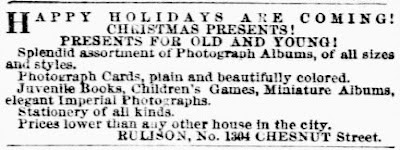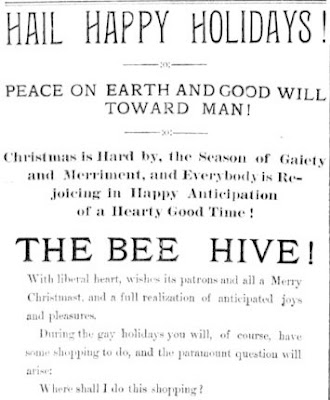"Happy Holidays" is a phrase that's been around the US for more than a hundred years. Here's an ad from the Philadelphia Inquirer on December 5, 1863:

Here's one from the Duluth News-Tribune of January 6, 1890:

And another from the Macon Telegraph on December 21, 1890:

As you can see, early on it was used more to describe the season as one of happy holidays than as a common greeting, but that seems to have changed by 1913, when on December 21 a letter in the San Jose Mercury-News appeared with this ending:

And in 1915, a note appears in the December 23 edition of the Lexington Herald about a card someone received with the inscription:

As you can see from the geographic spread of the above clippings (Pennsylvania, Minnesota, Georgia, California, and Kentucky), "Happy Holidays" has been in widespread use for a long time. It is not the recent creation of anti-Christmas secular liberals.
Ultimately, the meaning of "Happy Holidays" is separate from the phrase "Merry Christmas", not a replacement for it. In fact, when you think about it, it's weird to say "Merry Christmas" weeks before it happens, kind of like saying "Happy Birthday" weeks ahead of time or "Happy 4th of July" in June. Maybe if you say it referring to the future, as in "We wish you a Merry Christmas" or "Have a Merry Christmas," it makes a little more sense.
Happy Holidays, everyone!
The term Happy Holidays actually means when broken down Holy Days.
ReplyDeleteExcellent post! I totally agree that there is a time to use Merry Christmas, like "Have a Merry Christmas!", but it does not make me less of a Christian to say Happy Holidays to someone either!
ReplyDeleteInteresting research....and when did it become common to say in place of Merry Christmas?
ReplyDeleteThank you, well said.
ReplyDeleteAs you can see from your clippings and references to the "new year," a long, long time ago (as in the 19th century clippings) Happy Holidays originally meant Christmas and New Year's. So no, it did not refer to Hanukkah and Kwanzaa (not created until the 1960s), and yes, it was only recently that secular liberals starting warping the expression to mean something other than Christmas and New Year's.
ReplyDeleteI have decided that I will wish everyone Merry Christmas no matter if they like it or not. The politically correct version of "Happy Holidays" is not joyful. Christmas will be Christmas either you accept the true meaning of Christmas or not. December 25th will always be recognized as Christmas day.
ReplyDeleteI have always thought it reference the Christian holidays like. Advent, feast of stevens, St Nicholas day, Christmas, 12th night, 3 kings day, new years.
ReplyDeleteIt would have been nice had you added that holiday is actually a shortened way to say Holy Day, just as Christmas is a shortened way to say "Christ's Mass." Both are religious in intent. Just one is more specific to Christians, while the other encompasses and celebrates all forms of religions.
ReplyDeleteI've heard customer assistance in stores and ppl say Happy Thanksgiving or Happy Halloween on the day and even before the event. I'm a Christian and have friends who are non Christian say Merry Christmas because it is historically correct and nothing to do with religion for them and mind you, these are Australians I'm referring to and most that live there are atheist. I have lived in Asia, Australia, Papua New Guinea, Germany and Okinawa, Japan and every one will greet you "Merry Christmas". Here in America I'm surprised that for a country founded originally on freedom of religion, people are afraid they might offend an atheist!! What a load of bull and hypocrisy this country has become!!!!
ReplyDeleteThe context of it has always been about Christmas...which is easily discernible in those clips, so thanks for doing the homework...and 'potentially' Hanakkuh. Holidays does mean HOLY Days, and only God is Holy. It's never been intended to mean some kind of secular day off from work...but like everything else in this warped world, things get twisted and bent out of shape by those who can't deal with the truth to make it their own.
ReplyDeleteInteresting. However, I would like to see you do an international search of "Happy Holidays!" I bet you it's origin is specifically in the USA and that most other countries do not use the term nor are offended by it. Most countries have been homogeneous for most of their histories. They haven't seen a need to pander to multiple faiths/cultures. However, the USA is unique in that sense that it is a country of many cultures.
ReplyDeleteAnd as folks back in the day were separated by many a miles and often not seen often folks would say happy holidays to cover the up coming holiday season as I still do myself
ReplyDeleteThis is completely illogical and not any kind of evidence of the term in general use in history. I never heard the phrase used as child in the 50s and 60s. Just because a guy finds a few print references means nothing--this isn't true research and reflects the writer's bias in just finding a few examples that support his preconceived views.
ReplyDeleteBTW, look up the term "blaze" and you'll find millions of print references over the decades in reference to buildings on fire--but I dare you to find anyone who uses the word blaze in any verbal conversation about a building on fire. Once the front page of a major paper headlined "BLAZE GUTS RESTAURANT." Would you ever use that phrase to describe a fire in everyday conversation? What's written down doesn't always represent what is commonly said by people.